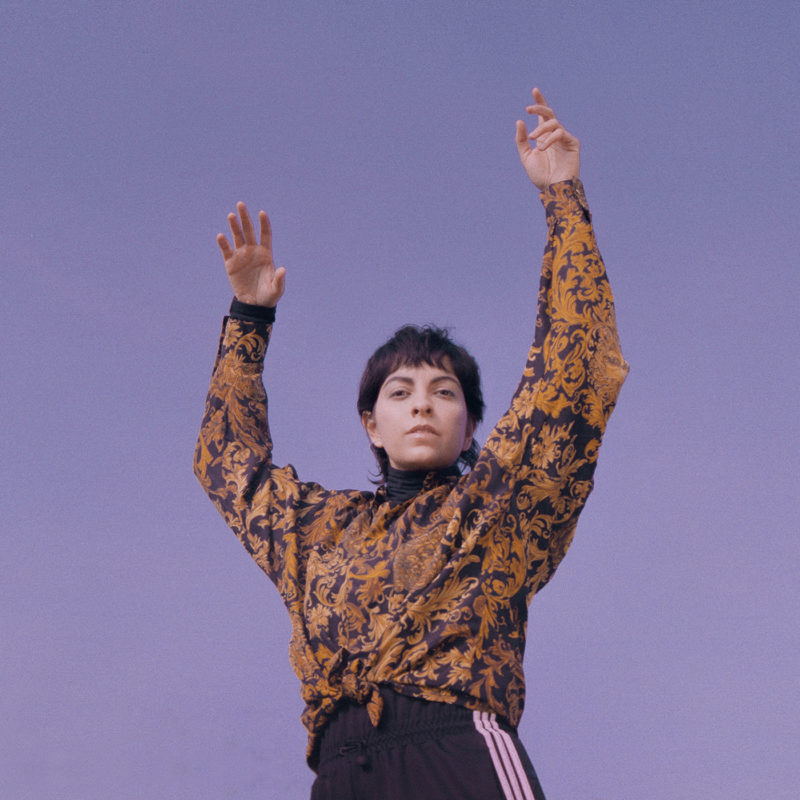
“I’m done. I’ve had enough,” Becca Mancari says to the image-oriented genre confining ethos of “Music City” where she lives, just outside of Nashville. With every platform she’s given, she dedicates the space to uplift voices of identities that have been shut down and out. With last year’s summer release The Greatest Part and recent follow-up EP Juniata, she un-silences her tale of growing up and coming out in a rural Pennsylvanian conservative Christian community. Now, years later, she’s “done being your cowboy, dressing up for you, and being used for representation.” She bows out from the Americana world, instead building up space in a city she loves in the backyard of her “blue Brady Bunch-lookin’ house full of lesbians.” As long as you’re down with it all,
“you’re invited to the fucking party!”
For Becca the words “I remember when” often come with a powerful memory. Her track “First Time” isn’t about the first time we might think, but about coming out to her father. “I remember the first time my dad didn’t hug me back,” she sings. Words that punch you right in the gut. In our conversation, she also remembers the pivotal moment when a queer friend called her a dyke—a word she was called hatefully when she was young: “you dyke, you little fag.” “Reclaiming those words as my own identity has been important. That’s why when I wrote The Greatest Part, I wanted to do it joyfully but talk about hard things. I was tired of hearing sadness. Because we always have these stories that are so sad. And that’s real. I have a hard story. But I wanted to join this joyous sound with that hard message. And I’m allowed to have that.”
In reds and pinks she “pushes herself into color,” ending the war between her masculine and feminine sides which appear in her previous music through a “black and white binary aesthetic.” She no longer self-others, pitting one part of herself against the other. Never one to adhere to a fixed box, she challenges the things that become too affixed to identity—like clothing, pronouns, her body. “My desire is to just be Becca. I’m figuring out that person.” She points to the choice of posing topless in the single art for “First Time.” She surprised herself, never thinking she would pose like that, viscerally confronting her feelings on what it means to inhabit a body with breasts, a question that dwells deeply. With a tinge of self-doubt, a close friend assured her, “This is the queer imagery we need from you!”

She has created a world that finds and attracts beautiful friends and queer folx that see, share, and validate these vulnerabilities—like questioning your body, defeating binary, receiving hate.
In allowing her music to depart from the Nashville Americana scene, she abandons spaces that don’t align, instead building her own. “I’ve always wanted my community to surround me. Supporting other womxn in music is a priority.” This isn’t easily found in Nashville despite the romanticized idea that Music City is for soul-searching troubadours meant to “find themselves.” But Nashville is hegemonic, exclusive, and suffocating. Becca’s Nashville home has offered respite for herself and her community. She remembers, pre-pandemic, when 30 of her womxn-identifying friends and favorite musicians gathered there to play music and be together. “I was reminded, we can do this. We can connect even in a deeper way than we have in previous years.” This home, which we see in her self-shot iPhone video for “Tear us Apart” will continue to be a haven.
She mentions how the same thing is happening with the rap community in Nashville, pointing to her friend Chico Rashad who “turns the country trope on its head with a country outfit, grills, and dreads.” She adds, “he takes up space in a town that has not given people like him the space and don’t care. I’m over it.”
And it’s this “over it” attitude that has fueled her fire, fueled the words against those who hatefully called her “dyke,” against harassing hate mail, against those who don’t get it. “I don’t write hateful music,” she clarifies. “I make music that’s personal and my own story. I hope it connects to others but it does come from me first and is for me first. With new choices I made like using color, I realize I had been afraid. That was the beginning of me starting to be vulnerable. I have been quieting myself and I don’t want to do that anymore.”
Listen to Juniata on Bandcamp here!
Listen to The Greatest Part on Bandcamp here!
